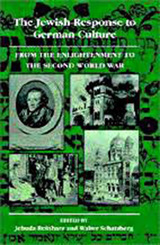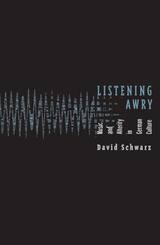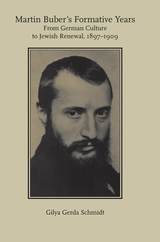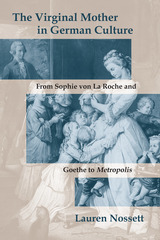4 books about German Culture

The Jewish Response to German Culture
From the Enlightenment to the Second World War
Jehuda Reinharz
Brandeis University Press, 1991
Seventeen scholars explore the interaction between a Jewish culture with its ancient heritage and an expansive German culture in the process of modernization.
[more]

Listening Awry
Music And Alterity In German Culture
David Schwarz
University of Minnesota Press, 2006
In his first book, Listening Subjects, David Schwarz succeeded in fusing post-Lacanian psychoanalytic, musical-theoretical, and musical-historical perspectives. In Listening Awry, he expands his project to “tell a story of historical modernism writ large”—how German music spanning two centuries refracts changes in society and culture, as well as the impacts of concepts introduced by psychoanalysis.Schwarz shows how post-Lacanian psychoanalysis can be applied to ideological interpellation that connects psychoanalysis to culture and how music theory can ground these considerations in precise details of musical textuality. He “listens awry” in several ways: by understanding musical meaning in both objective and socially structured ways, by embracing historical and also aesthetic approaches, by addressing high art as well as popular music, and by listening “around” conventional forms of musical meaning to reach toward that which evades signification.Structured around four themes—trauma, the other/Other, the look/gaze binary, and Judaism—Listening Awry explores five key moments in post-Enlightenment music: the rise of the singular orchestral conductor and the emergence of a new form of alterity, the Art Song and “the sublime of the delicate” (a correlate of the Kantian mathematical and dynamical sublime), the birth of psychoanalysis and the twentieth-century turn toward atonality, German war songs and the subversion of German music by the Nazis, and two different versions of Wagner’s Parsifal that were performed one hundred years apart and in radically different contexts.This highly original work, filled with imaginative readings and disquieting observations, links trauma with the culture and history of modernity and German music, deftly tying the experience of the body to the sounds it hears: how it reaches us slowly, penetrates the skin, and resonates.David Schwarz is assistant professor of music at the University of North Texas. He is the author of Listening Subjects: Music, Psychoanalysis, Culture.
[more]

Martin Buber's Formative Years
From German Culture to Jewish Renewal, 1897–1909
Gilya Gerda Schmidt
University of Alabama Press, 1995
An illuminating look at an understudied, but critical, period in Buber’s early career.
Martin Buber (1878–1965) has had a tremendous impact on the development of Jewish thought as a highly influential figure in 20th-century philosophy and theology. However, most of his key publications appeared during the last forty years of his life and little is known of the formative period in which he was searching for, and finding, the answers to crucial dilemmas affecting Jews and Germans alike. Now available in paperback, Martin Buber’s Formative Years illuminates this critical period in which the seeds were planted for all of his subsequent work.
During the period from 1897 to 1909, Buber's keen sense of the crisis of humanity, his intimate knowledge of German culture and Jewish sources, and his fearlessness in the face of possible ridicule challenged him to behave in a manner so outrageous and so contrary to German-Jewish tradition that he actually achieved a transformation of himself and those close to him. Calling on spiritual giants of great historical periods in German, Christian, and Jewish history—such as Nicolas of Cusa, Jakob Boehme, Israel Baal Shem Tov, Rabbi Nachman of Brazlav, Johann Wolfgang von Goethe, and Friedrich Nietzsche—Buber proceeded to subvert the existing order by turning his upside-down world of slave morality right side up once more.
By examining the multitude of disparate sources that Buber turned to for inspiration, Gilya Gerda Schmidt elucidates Buber's creative genius and his contribution to turn-of-the-century Jewish renewal. This comprehensive study concludes that Buber was successful in creating the German-Jewish symbiosis that emancipation was to have created for the two peoples but that this synthesis was tragic because it came too late for practical application by Jews in Germany.
Martin Buber (1878–1965) has had a tremendous impact on the development of Jewish thought as a highly influential figure in 20th-century philosophy and theology. However, most of his key publications appeared during the last forty years of his life and little is known of the formative period in which he was searching for, and finding, the answers to crucial dilemmas affecting Jews and Germans alike. Now available in paperback, Martin Buber’s Formative Years illuminates this critical period in which the seeds were planted for all of his subsequent work.
During the period from 1897 to 1909, Buber's keen sense of the crisis of humanity, his intimate knowledge of German culture and Jewish sources, and his fearlessness in the face of possible ridicule challenged him to behave in a manner so outrageous and so contrary to German-Jewish tradition that he actually achieved a transformation of himself and those close to him. Calling on spiritual giants of great historical periods in German, Christian, and Jewish history—such as Nicolas of Cusa, Jakob Boehme, Israel Baal Shem Tov, Rabbi Nachman of Brazlav, Johann Wolfgang von Goethe, and Friedrich Nietzsche—Buber proceeded to subvert the existing order by turning his upside-down world of slave morality right side up once more.
By examining the multitude of disparate sources that Buber turned to for inspiration, Gilya Gerda Schmidt elucidates Buber's creative genius and his contribution to turn-of-the-century Jewish renewal. This comprehensive study concludes that Buber was successful in creating the German-Jewish symbiosis that emancipation was to have created for the two peoples but that this synthesis was tragic because it came too late for practical application by Jews in Germany.
[more]

The Virginal Mother in German Culture
From Sophie von La Roche and Goethe to Metropolis
Lauren Nossett
Northwestern University Press, 2019
The Virginal Mother in German Culture presents an innovative and thorough analysis of the contradictory obsession with female virginity and idealization of maternal nature in Germany from the late eighteenth to the early twentieth centuries. Lauren Nossett explores how the complex social ideal of woman as both a sexless and maternal being led to the creation of a unique figure in German literature: the virginal mother. At the same time, she shows that the literary depictions of virginal mothers correspond to vilified biological mother figures, which point to a perceived threat in the long nineteenth century of the mother’s procreative power.
Examining the virginal mother in the first novel by a German woman (Sophie von La Roche), canonical texts by Goethe, nineteenth-century popular fiction, autobiographical works, and Thea von Harbou’s novel Metropolis and Fritz Lang’s film by the same name, this book highlights the virginal mother at pivotal moments in German history and cultural development: the entrance of women into the literary market, the Goethezeit, the foundation of the German Empire, and the volatile Weimar Republic. The Virginal Mother in German Culture will be of interest to students and scholars of German literature, history, cultural and social studies, and women’s studies.
Examining the virginal mother in the first novel by a German woman (Sophie von La Roche), canonical texts by Goethe, nineteenth-century popular fiction, autobiographical works, and Thea von Harbou’s novel Metropolis and Fritz Lang’s film by the same name, this book highlights the virginal mother at pivotal moments in German history and cultural development: the entrance of women into the literary market, the Goethezeit, the foundation of the German Empire, and the volatile Weimar Republic. The Virginal Mother in German Culture will be of interest to students and scholars of German literature, history, cultural and social studies, and women’s studies.
[more]
READERS
Browse our collection.
PUBLISHERS
See BiblioVault's publisher services.
STUDENT SERVICES
Files for college accessibility offices.
UChicago Accessibility Resources
home | accessibility | search | about | contact us
BiblioVault ® 2001 - 2024
The University of Chicago Press









